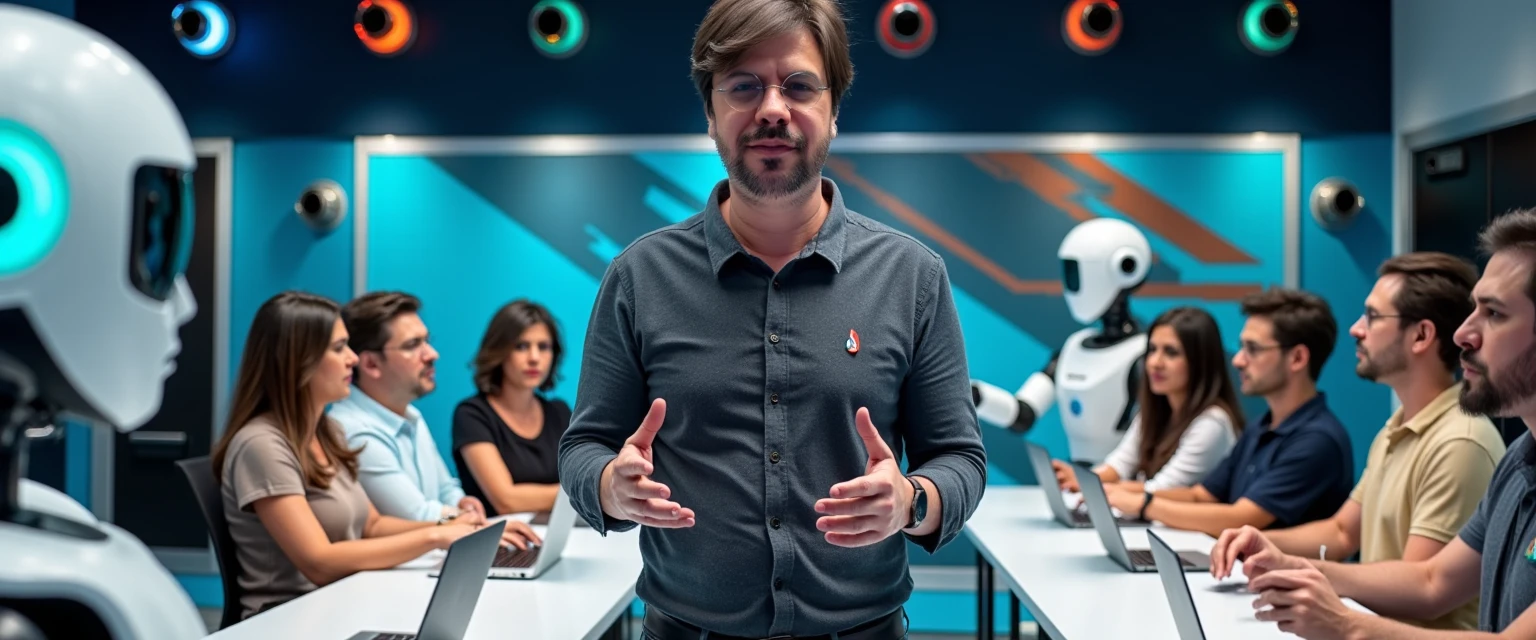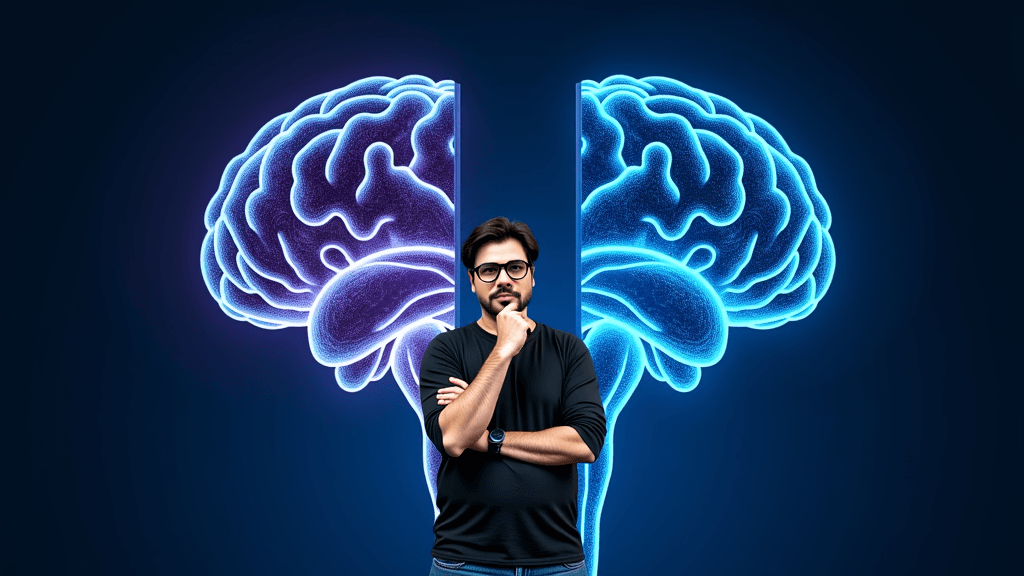AI Radar: Geopolitics, Security and the Tech Race – What Happened in the Last 24 Hours
April 8, 2025 | by Matos AI

AI geopolitical battle intensifies: US and China in fierce battle
Just under two years ago, when ChatGPT launched, most people viewed artificial intelligence as a technological curiosity. Today, we are witnessing a veritable digital arms race, with the world’s greatest powers vying for control of this transformative technology.
One of the hottest topics of the last 24 hours perfectly illustrates this scenario: Big US tech companies are using the “Chinese ghost” to try to loosen copyright laws in the US. According to UOL report, companies like OpenAI, Google, Microsoft and Meta are pressuring the US government to allow freer use of copyrighted content in training AI models.
The central argument? “If we don’t do this, China will overtake us.” It’s the old national security rhetoric applied to technology. It’s no wonder that China has a national plan to achieve AI sovereignty by 2030, while the US is still racing to formulate its “AI Action Plan.”
Join my WhatsApp groups! Daily updates with the most relevant news in the AI world and a vibrant community!
- AI for Business: focused on business and strategy.
- AI Builders: with a more technical and hands-on approach.
This battle goes far beyond technology itself – it’s a battle for economic, military and cultural power. The country that dominates AI will have enormous competitive advantages in virtually every field. And the tech giants know this.
The race for more powerful models: Meta launches Llama 4
Meanwhile, the race for ever more powerful models continues in full swing. Last weekend, Meta launched its new Llama 4 model, which includes two variants: Scout and Maverick. According to report by Poder360, both versions are multimodal – that is, they can process and integrate different types of data, such as text, video, images and audio.
What is noteworthy is that Meta maintains its open-source strategy, unlike OpenAI and other players in the market. This approach can accelerate the democratization of AI, allowing more developers and companies to create applications based on advanced models.
Additionally, Meta also introduced the Llama 4 Behemoth, described as a “teacher AI” that teaches other smaller models. As TeleSíntese article, this approach results in significant gains in reasoning tests.
However, there are controversies: according to the Esmael's Blog, Meta would be manipulating benchmarks, since the version of Maverick tested would not be the same as the one made available to the public. This type of situation raises important ethical questions about transparency in the AI industry.
Bill Gates and the Future of Work: Ready for the Revolution?
“Within a decade, AI will do what humans do.” This statement is not mine, nor that of any futurist, but that of Bill Gates, co-founder of Microsoft. According to Weather report, Gates believes that AI will completely redefine the role of humans in areas such as work, education and medicine.
On the one hand, he sees opportunities, such as eliminating the shortage of doctors in underserved areas. On the other, Mustafa Suleyman, Microsoft’s director of AI, warns that the technology could disrupt the workforce and replace jobs.
LinkedIn data reinforces this trend. A survey cited by State suggests that 70% of the skills used in most jobs will change by 2030, with AI being a major driver of these changes.
For years, I’ve been talking about the concept of CACACA – the six essential skills for the future of work: Creativity, Autonomy, Collaboration, Adaptability, Connection and Affection. In a world where AI takes over repetitive and analytical tasks, these typically human characteristics become even more valuable. In my mentoring with companies and professionals, I’ve emphasized the importance of developing these skills to successfully navigate the new economy.
The Dark Side of AI: Scams and Deepfakes Threaten Digital Security
Not everything is rosy in the world of AI. As technology advances, criminals are also finding more sophisticated ways to use it for malicious purposes. Brazilian Post Office warned about how AI is making cyber scams more convincing and dangerous, with the creation of fraudulent emails, cloned voice messages and videos manipulated with deepfakes.
Perhaps the most disturbing example is that of deepnudes, nude images produced by AI without the consent of the people portrayed. According to G1 report, the emotional impact on victims is devastating, with reports of young people who no longer wanted to return to school after having their images falsified and distributed.
These cases highlight the urgent need for ethical and legal regulation of AI, as well as digital education to prevent and combat such abuses. We cannot allow technological advancement to translate into social regression.
AI in public institutions: the pioneering case of Gramado
Amidst so much worrying news, there are also positive examples of how AI can be used to improve public services. The Gramado City Council (RS) became the first in Brazil to implement an artificial intelligence called LegIA in its legislative process, according to Terra report.
The goal is to increase efficiency, accessibility and transparency in the Chamber, allowing citizens to better understand the laws proposed by council members. It is a concrete example of how technology can bring public authorities closer to the population, democratizing access to information.
Initiatives like this show that, despite the challenges, Brazil has the potential to use AI in innovative and beneficial ways for society. In my lectures and consulting sessions, I often highlight cases like this to inspire public and private managers to see the transformative possibilities of technology.
AI in education: opportunities and risks
The use of AI by students is also in evidence. Tools like PDF To Brainrot allow you to convert pages of books into recordings of a few minutes, with audio and background images from games like Minecraft. According to GZH, these platforms have been widely used by students to summarize content.
However, experts warn that excessive use of these technologies can have negative effects on learning. Professor Vivian Lisbôa suggests that short videos should be a complement to learning and not the main source.
As someone who founded the first neo-university in Latin America, Sirius, I have a clear vision about the role of technology in education: it should be an ally in the learning process, not a shortcut that compromises cognitive development. The education of the future needs to balance the use of technological tools with the development of critical and socio-emotional skills.
Brazil in the AI era: challenges and opportunities
The scenario I have described so far leads us to a crucial question: what is Brazil’s place in this technological revolution? As an entrepreneur who has supported more than 10,000 startups, I see both challenges and opportunities for our country.
On the one hand, we have inspiring examples such as the Gramado City Council, showing that Brazilian institutions can adopt AI in innovative ways. On the other hand, we face serious problems such as the malicious use of technology for scams and deepfakes, without a robust regulatory framework to combat them.
Our position in the geopolitics of AI is also delicate. As the US and China vie for global leadership, we risk falling behind, importing technology instead of developing it locally. And with Bill Gates’ predictions about the impact of AI on the job market, we urgently need to prepare our workforce for the transformations that lie ahead.
However, I see reasons for optimism. Brazil has a vibrant startup ecosystem, top universities, and a growing culture of innovation. If we can harness these advantages and implement appropriate public policies, we can not only keep up with the AI revolution, but also contribute significantly to it.
What to do in this scenario?
If you are an entrepreneur, manager or professional concerned about the impact of AI on your business or career, some actions are essential:
- Continuing education: Stay up to date on AI trends and applications in your industry.
- CACACA Skills Development: Invest in capabilities that machines cannot easily replicate.
- Responsible experimentation: Test AI applications in your business or area of activity, always paying attention to ethical aspects.
- Collaboration: Join communities and networks that discuss and develop AI-based solutions.
- Advocacy: Engage in discussions about public policy and AI regulation.
In my mentoring work for startups and enterprises, I have helped organizations navigate this digital transformation, identifying opportunities for innovation and mitigating risks. AI is not just another technology – it is a paradigm shift that redefines how we live, work and interact.
The future is unwritten. It will be shaped by the choices we make today, by how we develop, regulate and use AI. I am convinced that with the right approach, we can ensure that this revolutionary technology benefits not just a privileged few, but society as a whole.
How are you preparing for the AI era? The news of the last 24 hours is just a small sample of the rapid pace of transformation we are experiencing. Follow this daily radar to stay at the forefront of this technological revolution.
✨Did you like it? You can sign up to receive 10K Digital's newsletters in your email, curated by me, with the best content about AI and business.
➡️ Join the 10K Community here
RELATED POSTS
View all



